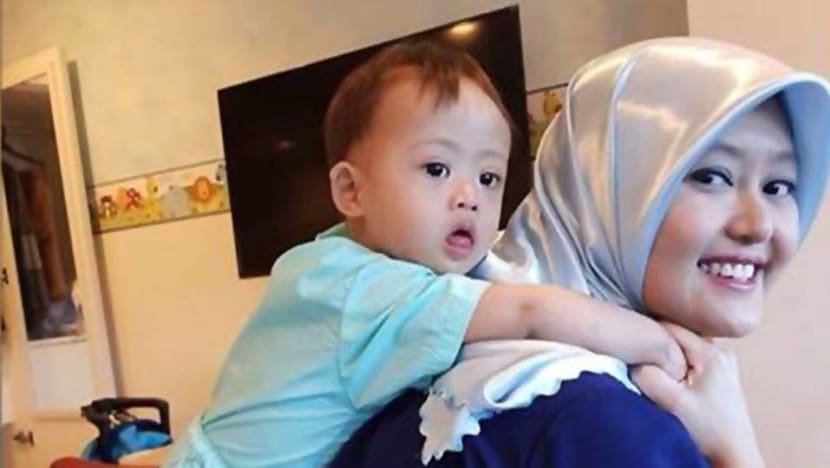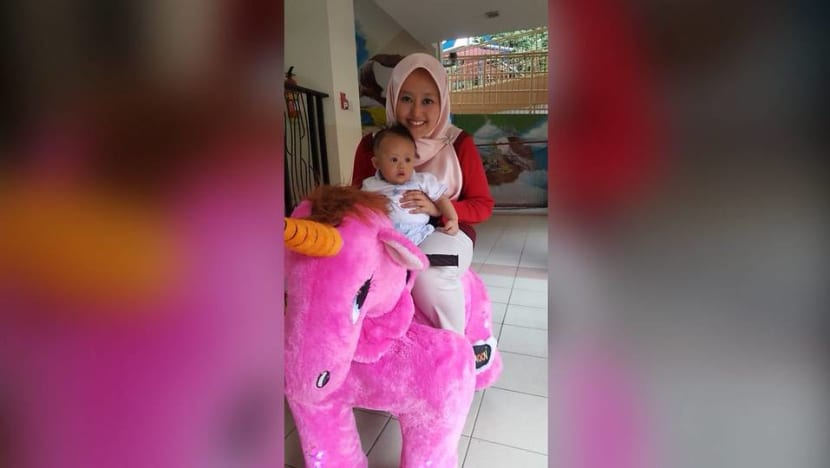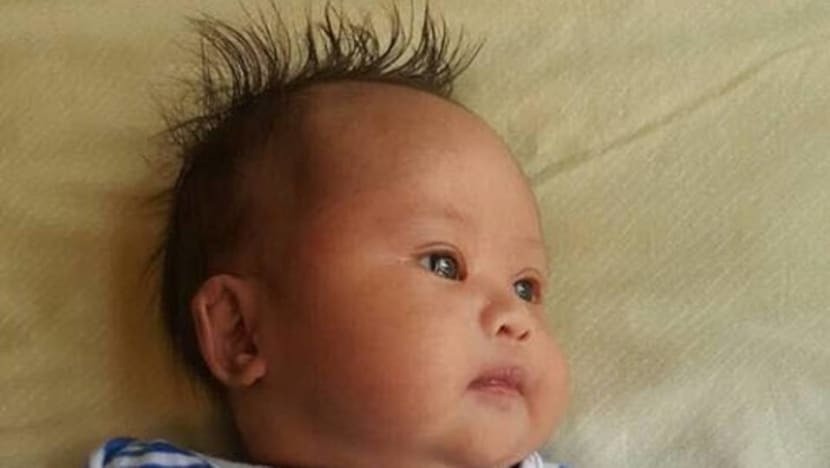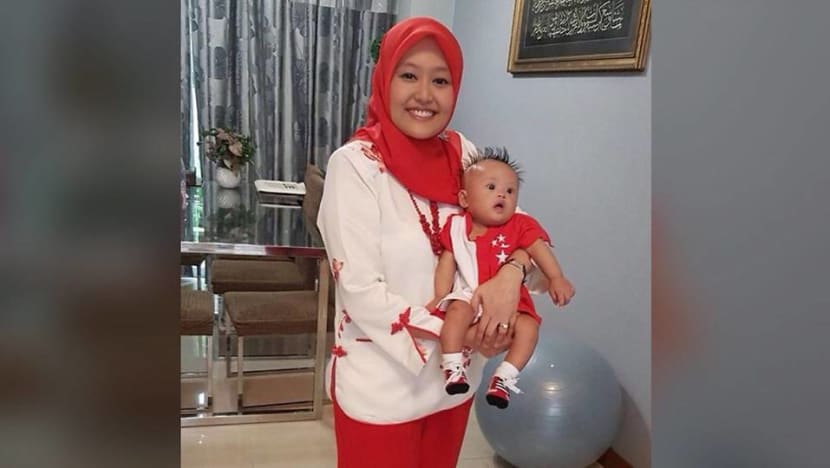Embracing the experience: MP Rahayu Mahzam on parenting a son with Down Syndrome
Member of Parliament Rahayu Mahzam recently revealed in Parliament that her 16-month-old son, Ayden, has Down Syndrome. She speaks to Channel NewsAsia on the ups and downs of being a mother, the support she’s found and her future plans on being a voice for the special needs community.

MP Rahayu Mahzam with her son, Ayden, in a photo taken in June 2018. (Photo courtesy of Rahayu Mahzam)
SINGAPORE: Juggling work and motherhood, says Rahayu Mahzam, is one of the biggest challenges she faces. But it is clear that the Member of Parliament for Jurong GRC, who is a lawyer, also enjoys her new role as a mother to her 16-month-old son, Ayden.
As she cheerfully and animatedly recounts anecdotes of how she juggles her work commitments with her duties as a mother, she breaks into peals of laughter periodically as she recalls amusing stories.
There was once, she said, she had to leave for work early, and left Ayden, who is her only child, with her sister-in-law.
“So he takes a while to warm up, and he woke up to a stranger. And she sent me a picture of him, and the whole time, he was looking at her like that,” she recounted, demonstrating a suspicious, side-eyed look. “She bathed him, fed him, gave him his milk, and the whole time, he was looking at her like that.”
“When I came home, I was rewarded with a smack on my face,” she added, laughing.
She is quick to emphasise that the issues she faces as a working mother are common to many other parents. But her journey is slightly different: It is one which involves perhaps a little more fear and worry, and a host of additional medical appointments.
Because Ayden, she revealed in an impassioned speech in Parliament last month, has Down Syndrome.
GOING PUBLIC
Mdm Rahayu had never hidden Ayden’s condition from friends and family.
But her speech, in which she spoke frankly about her personal experiences as a mother of a child with special needs and called for more to be done in the area of inclusive education, was the first time, she said, she was revealing Ayden’s condition on “such a public platform”.
“I wanted to talk about the issue because I was aware of some of the things that other parents were facing, but it wasn’t just about me,” she said. “And also, I was very conscious about labelling him, because he’s so young, and doesn’t have a say in how he’s put up.
"People might also see him a certain way after that.”
But despite her concerns, she went ahead with the speech, as she felt the points she was making were important, and would resonate with many other parents of children with special needs. Some, she said, reached out to her after she made the speech.
“The stories, feelings and emotions ... I just wanted to send that message. And generally people appreciated that I captured that emotion.”

TERMINATION WAS NEVER AN OPTION
Doctors first raised the possibility that Ayden had Down Syndrome when Mdm Rahayu was about five months’ pregnant. The genetic condition, which is caused by the presence of an extra chromosome, can result in developmental delays.
“It was very scary, because it wasn’t just Down Syndrome,” she explained. “There was a whole range of other issues, and also a possibility that the child may not survive pregnancy and childbirth.
“And when I asked the doctors if there was anything I could do about it, or if there is any treatment for the condition, they said no, but there’s an option for termination."
But termination, she stressed, had never crossed her mind.
“I’ve waited so long for a child, and I’ve grown up valuing life and knowing there’s always a reason why things happen ... to me, it was just a challenge that I had to overcome,” she said.
She had spoken in a previous interview about how she and her husband were seeking treatment to conceive. And she added that having gone through a previous pregnancy which ended in a miscarriage made her even more cautious.
“I didn’t want to dwell on it too much, but that kind of added a layer of fear,” she said. “But it was that uncertainty and concern about not knowing, and not being able to see the child, and worrying that the child may not survive the pregnancy.
“I didn’t even buy baby things until much later, because I wasn’t even sure that the baby would grow,” she added.
Dealing with her own emotions was one thing, and she recalled that picking herself up and simply getting busy “without thinking so much about it” helped her work out her pain. But dealing with the emotions of her family members and loved ones was, she said, a whole different issue altogether.
“I needed to tell them so they could prepare themselves mentally, but I couldn’t handle their reactions,” she said, recounting a particular conversation she had with her mother.
“It was quite difficult when I was trying to tell her ... okay, don’t get so excited because something might happen and I want you to be okay with it,” she said. “But at the same time, you’ve just got to keep praying and hope for the best.”
But ultimately, she is grateful for the support she got from her family members, who rallied around her and helped her out in ways big and small.
“My mum would do little things on a daily basis like cooking for me, buying me maternity pants and new clothes, and my sister also bought me a top so I could look decent on National Day,” she said.
“So it’s all these regular family things that may not matter so much, but it helps, because you’re just busy trying to get on with the days of your life.”
“I COULDN’T REALLY CELEBRATE BECAUSE HE WASN’T THERE”
She remembers it was a “sad feeling” when Ayden was born, because she could not be with him.
“The first day, I only saw him for a bit before they took him away to do tests,” she explained.
“When people were visiting, they would ask me where the baby was, and because he was in the special care nursery, nobody got to see him.
“I couldn’t really celebrate because he wasn’t there. So I focused on just getting better, so that I could walk and get out of bed and see him.”
She recalled an incident when she burst into tears upon receiving news that Ayden was to be moved to the Neonatal Intensive Care Unit (NICU).
“When I was walking to the NICU, I just burst,” she said. “I was crying and crying and I think I must have scared off other parents.”
“The nurses all kind of panicked, and brought me to a room, and they brought out all my doctors who were very kind and explained everything to me,” she said. “Thankfully, it was just that it didn't look like he was breathing so well, so they had to bring him to NICU because the equipment was there.”

FINDING SUPPORT FROM FAMILY, SPECIAL NEEDS COMMUNITY
It was about three weeks before Ayden could be brought home from the hospital. But there was another part of the challenge: The constant medical appointments Ayden had to go for.
Quipping that she was at KK Women’s and Children’s Hospital so often that she should get a “club membership”, Mdm Rahayu recalled being there almost “every other week”.
“It was so physically tiring, and there was work too,” she said, explaining that she started work again “fairly early”. She also started on her MP duties again, with Meet-the-People sessions coming in after a month, and market visits after two.
Things have gotten less hectic now, as Ayden’s schedule has settled into “some sort of regularity”. But she remains grateful for the family support that has continued even after she gave birth.
She considers herself fortunate to have a network of family members she can call on to help take care of Ayden when she and her husband have to work.
“Everyone was very zen about it,” she said. “I used to be worried before, but now I’m a bit more zen about it too, because I know that there are people who are just there for me.”
Support was also found from the special needs community.
It started small, from chatting with parents at Ayden’s sessions at the Down Syndrome Association, and she is now part of two informal WhatsApp groups for parents of children with Down Syndrome, which she says is a “repository of things”.
“Sometimes, I’m hearing stories from mothers, and commiserating, and other times, it’s practical advice, like what to do when a child has constipation, or how to find a pre-school that accepts my child,” she said. “It’s beeping constantly, but it’s really useful”.
Being plugged into the group – and the community – also came in useful when researching her speech in Parliament, as she was able to tap on the networks to meet different groups of parents to hear their stories and understand their concerns.
But she stressed that while her speech was a good starting point to raise awareness for the community, she is well aware that she has not “fully captured everything”.
“The spectrum is very diverse, and there are different levels of support for different groups and families,” she said. “But at least there’s the awareness now. So I need to keep track and follow through with some of the things I have pushed.”

ON ADVOCATING FOR THE SPECIAL NEEDS COMMUNITY
Mdm Rahayu recognises that her role as a Member of Parliament has placed her in a unique position to be a voice for issues close to her heart. Such as, for example, the special needs community.
But she is quick to brush aside comparisons to her fellow MP Denise Phua, who is well-known for being an advocate for the community.
“I definitely think I can help, but I cannot fill her shoes,” she said. “She is a legend in her own right, and she’s been around for years.”
“But clearly, I am already putting my hand up for things related to this sector, because I can appreciate it and I already have a conduit of feedback I can convey. So I guess that’s part of it.”
The title of advocate for the special needs community is, she added, a “big title that (she) feels too small to accept.”
“It’s not that I’m starting anything new, it’s more like helping to push things to a new level,” she said.
She added that there are also other issues she is already advocating for as an MP, such as multiracial harmony, families, youths, as well as the Malay language. “It’s not like I’m going to throw these away just because I have a new cause,” she said.
But she stressed that inclusive education – and a compassionate society – remains something that is close to her heart, and something she will continue to speak out about.
“We’re at a stage where we’ve kind of met Maslow’s hierarchy of needs, and we need to layer that with the soft aspects,” she said. “By being inclusive and creating awareness, then the community becomes more conscious.”
“Look at how we did it with multiracialism,” she explained. “Where it is not an issue that your friend is from a different racial background.
“Same thing for people with special needs ... where you really normalise it so you don’t see them because of their disability, but as someone who is part of your community.”
Today, despite the initial road bumps on her journey, it is clear that Mdm Rahayu is embracing the experience of being a mother.
"Of course I worry, but I’m embracing it," she said. "I feel very fortunate and privileged to be given this honour to take care of him."
“We’re doing our best to make sure Ayden is up to speed,” she added. “But I really hope people won’t make fun of him, dismiss him or take advantage of him.
“I hope the world will be a better place by the time he grows up.”














